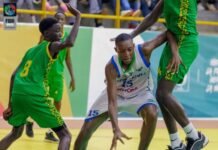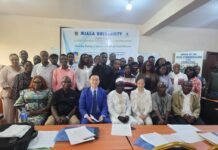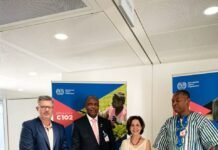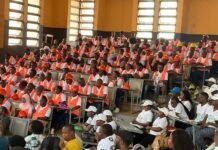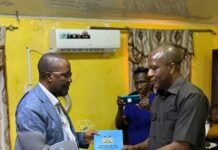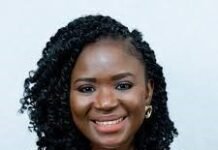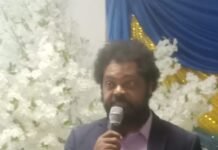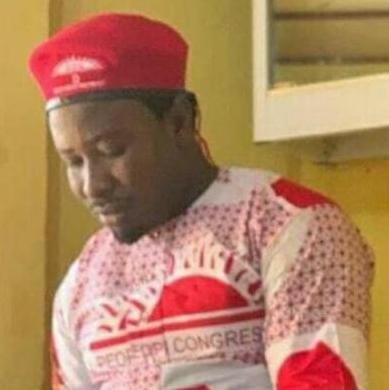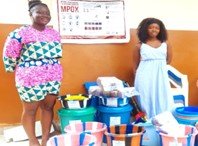By: Melvin Tejan Mansaray
On Monday, 27th April 2020, the nation of Sierra Leone observed its fifty ninth (59th) independence anniversary without any public celebration due the the coronavirus pandemic hurting the country and globe.
Sierra Leone, fifty nine years ago through its first Prime Minister, Sir. Milton Augustus Margai received the Instrument of Sovereignty from the Duke of Kent (British) in its first legislative assembly making it the twelfth independent member of the Commonwealth of nations.
Sierra Leoneans are used to observe independence day with pomp, pageantry and lavish government spending but due to the COVID-19 pandemic, the event was observed in a low key with the Head of State, President Julius Maada Bio himself delivering his independence message in self isolation following the testing positive of one of his security guard.
As at Monday 27th April, 2020, the country recorded total cumulative confirm positive cases of ninety nine (99) with four (4) deaths, eighty five (85) cases in isolation centers, ten (10) recoveries and one thousand one hundred and eighty seven (1,187) in quarantine and one thousand two hundred and ninety two (1,292) being released.
Speaking in an online interview, Minkailu Koroma, Political Reformer, Spokesman National Reformation Movement (NRM), All People’s Congress (APC) main opposition parliamentary party said that if political parties do not reform themselves now the country and its people are doomed.
He was responding to the questions around the country’s fifty ninth independence anniversary and how will political parties reform or reluctance to reform affect the coming decades, looking at contemporary issues affecting post independence Sierra Leone.
“Certainly, If political parties do not reform, the country will perish. A political party is a government in waiting. Political parties govern the state based on their manifestos and the social contract they have with the citizenry and so, if they aren’t up to the task and cannot present better alternatives, it is the country that will suffer,” Minkailu said.
It is the belief of Minkailu that the fascination of independence is a façade arguing that it was only the symbol of sovereignty that was transfered between the British and Sierra Leoneans.
He argued that the country is a mere autonomous and not an independent state.
Minkailu said: “Sierra Leone is an autonomous state and not an independent one,
the reason being that we are not economically independent and so we can never solely determine what we want and how we want it,” adding that, ” those who put their monies in our affairs will always have a say in how we conduct our affairs.”
Quizzed on what in his view can change the trend of foreign meddling and interference into the national politics of Sierra Leone, the APC’s
NRM Spokesman said, “We can start by changing the narrative; reform the political parties, put country above party sentiments, embrace civic education, build a sense of nationalism and patriotism in the minds of the upcoming generation, etc.”
According to some critics of the political class, the APC party contributed hugely to the nation’s backwardness. History have it that Minkailu’s party (APC) opposed independence some fifty nine years ago arguing that there should be elections before independence, it reportedly attempted to disturb the transition of sovereign power six days ahead of independence which saw the arrest of scores of its members by the SLPP Margai administration. After it eventually gained political control of the country, the APC believably plunged the country’s economy although the Colonialists had arguably contributed its own part too with the exploitation of the country’s mineral and other resources.
Asked if the above narration of the country’s political history is not a partial fact that both the APC and SLPP are most culpable for the country’s woes if not the Brits, Minkailu Koroma said:
“Those critics have a right to their opinions and they may be equally correct to a very large extent.”
Koroma however reechoed his thematic message, saying that
“Certainly! If political parties do not reform, the country will perish. A political party is a government in waiting. Political parties govern the state based on their manifestos and the social contract they have with the citizenry and so, if they aren’t up to the task and cannot present better alternatives, it is the country that will suffer!!”
Reforming political parties are not a common phenomenon in the political macrocosm and microcosm of Sierra Leone, this is particularly so for internal party statues regarding anti party activities and its repercussions, mainly membership expulsion and other sanctions for persons with dissenting views.
The main opposition APC party is one that is deemed politically apprehensive to internal party reforms less to talk about the governing SLPP, the oldest in the country, despite being seen as more internally liberal and democratic in nature.
Political parties constitutionally exist to shape the political will of the people and nation, but critics say the two dominant parties lack political ideologies which has crippled the nations progress fifty nine years on.
Is there a tidal wave of internal political party reform blowing in Sierra Leone, looking at the APC’s NRM as a model, Minkailu said : “Sure, the NRM is an inspiration, many more will soon rise and join the reformation crusade.”
When and how will political reformation crusade hold sway in Sierra Leone is a titanic question especially considering when a political party is in office.
Responding to the question, can a political party hold itself accountable while in governance, Minkailu said, “that is how it should be but in the case of Sierra Leone and many other countries around the world, it is not the case. The truth is that accountability and transparency in governance are the watch words of democratic governance and especially good governance.”
An effective Media and Civil Society are said to be the life blood of democratic governance, but have they been owning up to this sacred duty of serving as watchdogs over time, Minkailu thinks so though with a reservation.
“They have been some how effective. We have those who are doing their work independently and some who by their make up and the way they conduct themselves and their activities, they have been aligned to certain political parties.”
He nonetheless critiqued by saying that,
“again, we have those who are in Journalism and Civil Society Activism as a business. They always write or advocate for the highest bidder. The good news is, we have few who are upright and have uphold the pride and integrity of the profession.”
Legislative sanctity is another hallmark of democratic separation of powers ideal.
This is a notion wherein a Parliament holds the Executive and other arms of the realms to accountability and transparency in the interests of the citizenry.
Has the Legislature exerted its authority over the Executive arm enough, or has the Executive subjected itself to legislative scrutiny enough in the decades of democratic rule in Sierra Leone, Minkailu does not think so.
He said: “In the case of Sierra Leone, the legislature is powerless. That one man called the President who is head of the Executive arm of government is the most powerful person in the country and can do anything at anytime without even considering the implications of what the law says.”
In conclusion, a retrospective and prospective look back and ahead at fifty nine years; what is the electorate and the elected missing, when and how this great sociopolitical disjoint be fixed,
Minkailu Koroma said: “The electorate (givers of political power) are missing the fact that the elected (holders of political power) are their servants and that in fact they (electorate) gave them a job. Instead, they are seeing them (elected) as demi-gods and in some instances, worshiping them instead of holding them accountable.
On the other hand, the elected are taking the electorate for granted forgetting that sovereignty belongs to the people. They are also quick to forget the social contract they signed with their electors before assuming power and authority.”






